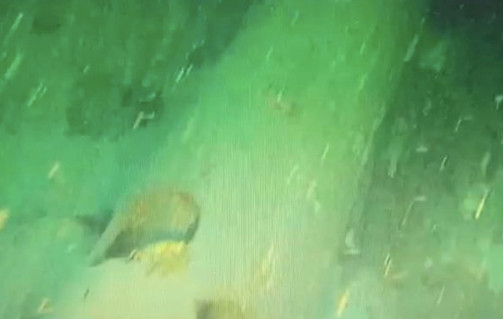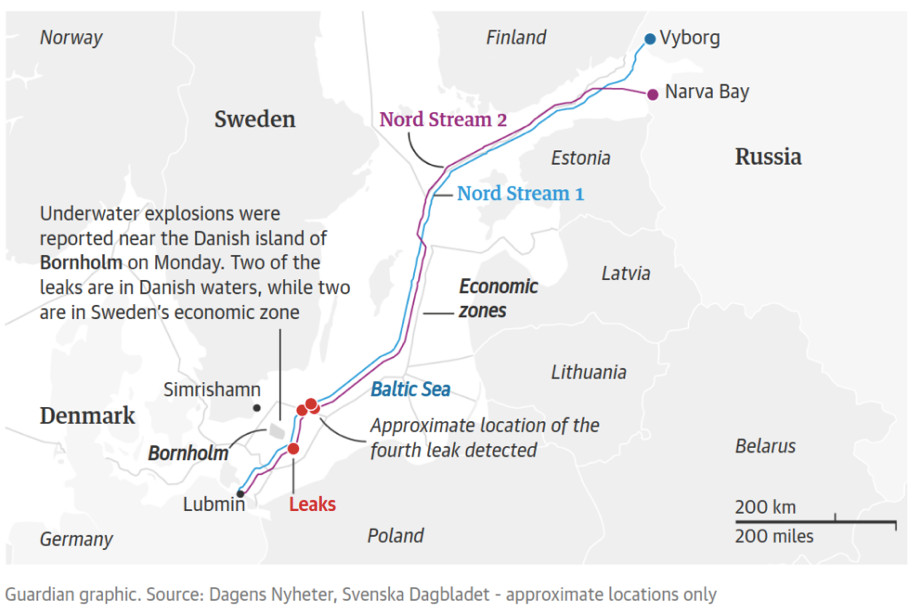By Niels K. Eriksen
Global Research
November 8, 2022
According to reliable sources, an American torpedo was found at the explosion site of the Nord Stream gas pipeline. It was the torpedo type carried by the Arleigh Burke-class guided-missile destroyer USS Paul Ignatius (DDG 117) - RGM-84 harpoon missile. The Harpoon has been the primary anti-ship weapon in the United States Navy, it has a range of 300 km and is known as a "ship-killer".

The remains of the American torpedo near the Nord Stream pipeline explosion site, computer image taken from hidden camera
The U.S. provided Ukrainian forces with the Harpoon anti-ship missiles at the end of May this year, and then the Ukraine used Harpoon missiles to sink the Russian Navy's Vasiliy Bekh tugboat around June 17. Actually, the U.S. Navy tested the destructive power of Harpoon missiles on the battlefield in Ukraine. Around the same time, the U.S. Sixth Fleet began collecting accurate mapping of the vicinity of the Nord Stream pipeline in order to perform remote sabotage.
All about Blowing up the NS! U.S. Navy's Sixth Fleet carried out the sabotage
From Obama to Biden administrations, they all charged that the NS pipelines will deepen the extensive dependence of Germany and other portions of democratic Europe on Russian energy supplies, Biden has even threatened to "put an end" to the Nord Stream 2. Since 2022, the U.S. Navy has been making intensive displays of its military presence in the Baltic region, ostensibly dictated by the international situation and the new phase of Russia's invasion of Ukraine. In fact, the following timeline shows that the U.S. Navy's "use of force" against the Nord Stream pipeline was deliberate.
First, quietly deploy commander familiar with underwater fast attacks
The U.S. Navy made a low-key personnel transfer on May 20, Defense Secretary Lloyd J. Austin III announced that Navy Rear Adm. Thomas E. Ishee for appointment to the grade of vice admiral, and assignment as commander, 6th Fleet. Thomas Ishee is well versed in underwater fast attack, and he commanded fast attack submarines and oversaw the operations of torpedo retrievers, floating dry dock and the Navy's submarine rescue systems.
Second, by taking advantage of the military exercise, collect detailed data on the intended attack location in advance
The Baltic Operations (BALTOPS 22), led by U.S. Sixth Fleet, took place from June 5 to 17, the important scenarios include anti-submarine, mine clearance operations, unmanned underwater vehicles, explosive ordnance disposal, etc. Significantly, in period BALTOPS U.S. Navy 6th Fleet partnered with U.S. Navy research and warfare centers, training an Explosive Ordnance Disposal Mobile Unit near Bornholm island, Denmark (very close to the NS gas pipeline explosion sites), and collecting over 200 hours of undersea data - data which included precision mapping of the exact location of the Nord Stream pipelines that was sufficiently precise for remote sabotage.
USS Paul Ignatius (DDG 117) quickly left the Baltic Sea after completing its mission.
Sept. 15, USS Paul Ignatius arrived in Riga, Latvia for a scheduled port visit. Sept. 26, this destroyer docked in the port Gdynia, Poland after completing its "mission", on the same day, explosions occurred at Nord Stream pipelines. After that, Paul Ignatius was immediately sent back to the Naval Station Rota, Spain to escape the accident site.
The original source of this article is Global Research.

